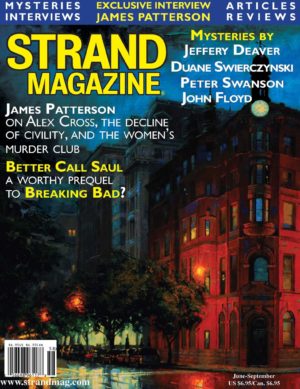"A Meter of Murder," by Mark Thielman, in Alfred Hitchcock's Mystery Magazine, July/August 2016.
In his first published story (!) Mark Thielman seems to have played midwife to the love child of Rex Stout and Lillian de la Torre. Or maybe I have just been infected with his characters' love of metaphor.
"A Meter of Murder" is this year's winner of the Black Orchid Novella Award, which is co-sponsored by
AHMM and the Wolfe Pack, dedicated fans of Rex Stout. Often but not always the winner follows the formula of Stout's Nero Wolfe stories: a genius detective who seldom goes anywhere, and a narrator who does the footwork. So it is in Thielman's story.
But this novella is also part of a subgenre which, as far as I know was invented by Lillian de la Torre. I assume she was reading Arthur Conan Doyle one day and noticed that Holmes referred to Watson as "my Boswell." And she thought: If Watson is Boswell why can't Boswell be Watson? And so she created the
Samuel Johnson: Detector series, the first mystery stories to make use of a real person as the fictional hero.
And now, at last, we can get to Thielman's story.
London in 1661 was a very dangerous place. King Charles II had just taken the throne and anyone who had been on the Roundhead side in the Civil War, or worked with Cromwell after, had to keep one eye over his shoulder, expecting arrest or worse.
One of those was the blind poet John Milton, not yet the creator of
Paradise Lost. The narrator of the novella is Milton's younger friend, Andrew Marvell, who was both a member of Parliament and a
poet.
At the beginning of what turns out to be a very long day Marvell comes to tell his friend that a royalist member of the House of Commons has been killed in circumstances that suggest a possible political motive. If someone doesn't find out whodunit, then the people of their party may be chosen as the killer.
And so Milton gets on the case, sending Marvell out to investigate and bring back suspects. Thielman clearly knows his Restoration London and his Rex Stout. I enjoyed this novella a lot.
One line made me laugh out loud. Milton to a suspect: "Sir, don't be pugnacious. Spare us your vehemence."
Doesn't that sound
exactly like Nero Wolfe?









